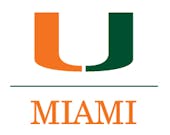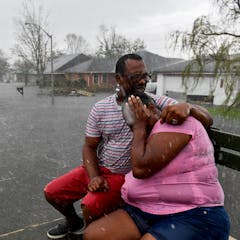
University of Miami

A private research university with more than 15,000 students from around the world, the University of Miami is a vibrant and diverse academic community focused on teaching and learning, the discovery of new knowledge, and service to the South Florida region and beyond.
Links
Displaying 1 - 20 of 71 articles

New research shows that opt-in policies may not be as effective as intended when it comes to data protection and privacy regulations.

A survey of Miami-Dade residents found bipartisan support for protecting Biscayne Bay − though most locals were not aware of the extent of its decline in recent years.

After scientists’ GPS tracking tag was violently removed from one shark’s dorsal fin, they were in for a surprise: The wound didn’t just heal, but the missing tissue grew back.

The imposition of fines and fees on people unable to pay has had a disproportionate impact on Black and Latino communities.

From math to evolutionary game theory, looking at cancer through different lenses can offer further insights on how to approach treatment resistance, metastasis and health disparities.

While lung cancer rates have decreased by 43% in men, they have risen by 79% in women. New screening guidelines and recognizing early symptoms can help address the changing face of lung cancer.

In clinical trials, lecanemab slowed disease progression by 27% and reduced the amount of plaque found in the brains of those with Alzheimer’s disease.

Miami is often held up as an example of ‘climate gentrification.’ But a closer look finds a bigger driver of flashy new developments in low-income neighborhoods.

More than 22 million people currently live in Florida following a century of rapid growth.

The meteorologist leading NOAA’s 2022 hurricane field program describes flying through eyewalls and the technology in these airborne labs for tracking rapid intensification in real time.

Antiretroviral therapies for HIV, while extremely effective, need to be taken daily for life. Designing antibody treatments that need to be taken only once could improve compliance and reduce drug resistance.

Termites are about to experience a significant global expansion in their prime habitat, thanks to climate change. Here’s what that means for deadwood.

As more younger, single men ask for one following the Supreme Court abortion decision, a urologist explains what to expect with a vasectomy.

It has long puzzled researchers why Latinos seem to have lower rates of heart disease than their non-Latino counterparts, even though they have higher risk factors for heart disease.

With La Niña helping clear the way for a busy hurricane season, this wide current of warm water could spell disaster for the northern Gulf Coast.

The words that doctors choose during a consultation – and even the verb tense – can help or hurt a patient dealing with a difficult diagnosis.

Some cancers are actually caused by viruses that linger for long periods in the body, or cause physical damage that later turns cancerous.

Blood plays a vital role in keeping us alive, from delivering oxygen to the body’s organs to fighting off infections.

A hurricane that wreaked havoc from Louisiana to New York City, the Texas freeze and devastating western wildfires topped NOAA’s list of billion-dollar disasters in 2021.

Excessive heat puts your body at risk for organ damage. When workers don’t have a chance to cool off at home between shifts, that harm can accumulate.
